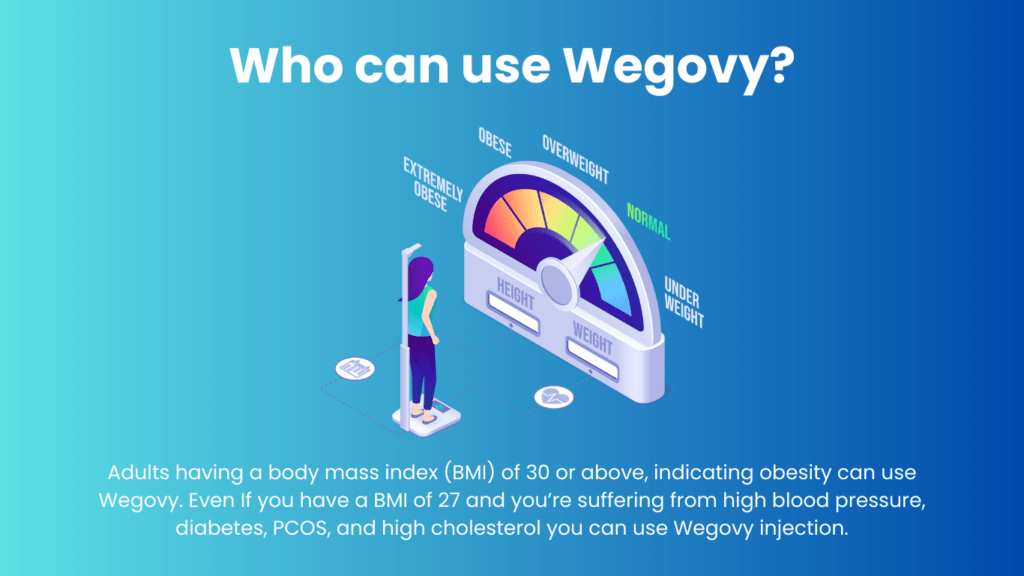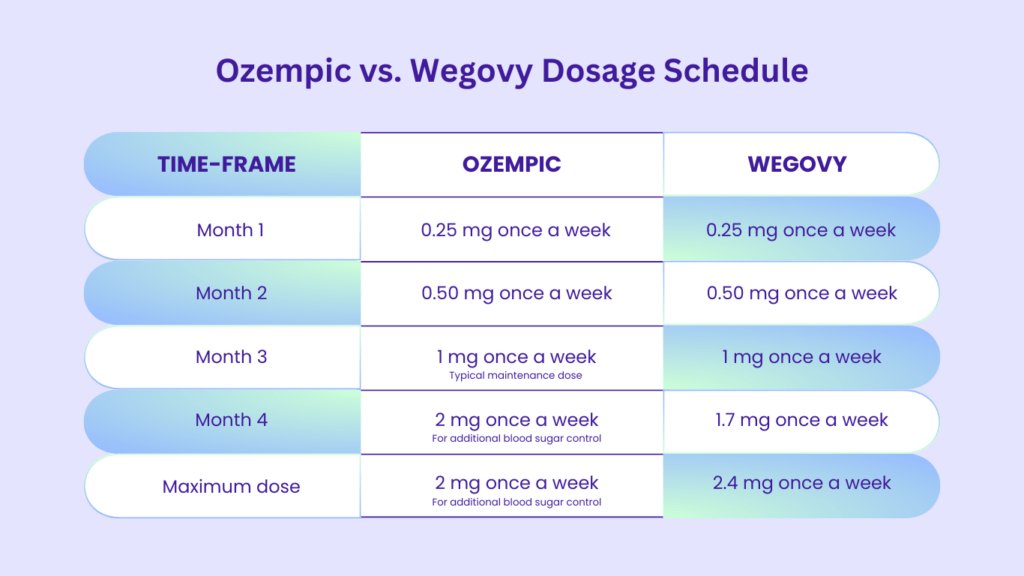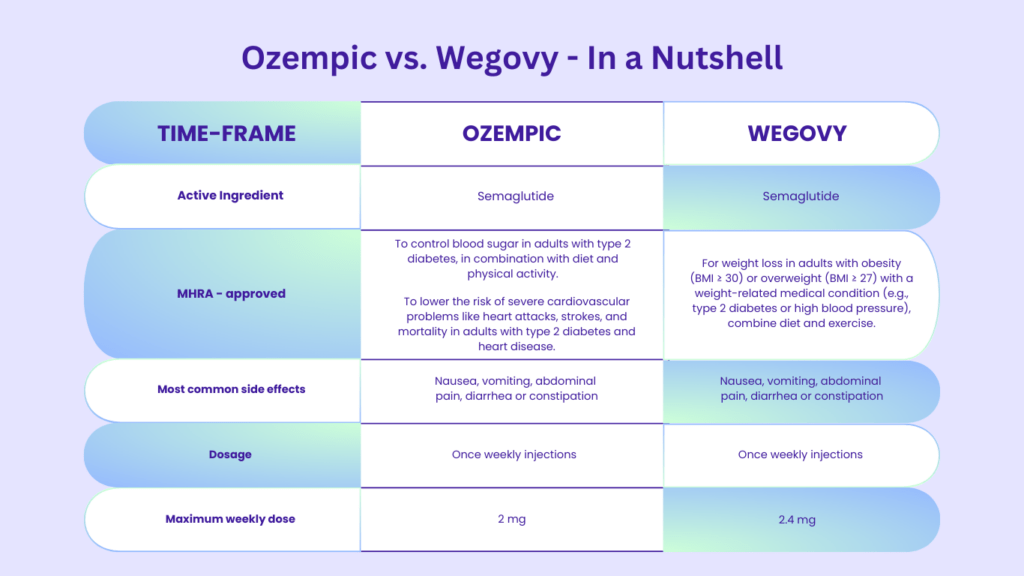If you’re trying to manage type 2 diabetes or obesity, you’ve probably come across weight loss medications like Ozempic and Wegovy. There’s also a good chance you’ve started to hear more about Wegovy.
Wegovy and Ozempic are two drugs that both contain Semaglutide. This active ingredient is used to treat type-2 diabetes and for long-term weight management.
Even though they have the same active ingredient, they are designed for 2 different conditions, so you can’t just swap Ozempic for Wegovy or vice versa without consulting with your GP. Some important differences affect how they’re used and who should take them.
To simplify things, we’ve created an easy-to-follow guide explaining the key differences between Wegovy and Ozempic and how to use each one.
What is Ozempic?
Ozempic is a prescription-only medication used to manage type 2 diabetes. It is designed to help control blood sugar levels and has also been found to reduce the risk of stroke or heart attack.
Clinical trials have demonstrated that semaglutide is highly effective for weight loss. Consequently, in 2019, clinicians in the UK started off-label prescribing of Ozempic for weight management.
The medicine acts as a glucagon-like peptide-1 (GLP-1) receptor agonist, mimicking the action of natural hormones in your body. Ozempic has been a game-changer in managing health conditions for many people.
What is Wegovy?
Wegovy is also based on the active ingredient semaglutide and is primarily aimed at weight management. It’s approved explicitly for chronic weight management in adults who are overweight or obese and have weight-related health issues like menopause, heart disease, or type 2 diabetes.
Like Ozempic, Wegovy is injected subcutaneously but comes with a higher dose focused on weight loss.
Even though these two brands have the same active ingredient, semaglutide, they are formally authorised for different purposes.
Wegovy, approved in the UK in September 2023, is a newer addition than Ozempic.

What is the Difference Between Ozempic & Wegovy?
Ozempic and Wegovy are both similar in a lot of ways. For example, both medications contain semaglutide as an active ingredient, which helps in managing body weight. Furthermore, both are injection pens administered in the body.
Although semaglutide is an active ingredient in both injections, the key difference lies in their primary use and dosage.
During clinical trials, Wegovy and Ozempic were investigated for distinct purposes. The trials for Wegovy primarily evaluated its effectiveness in weight management, whereas Ozempic trials aimed to assess its impact on glycemic control. The outcomes of these studies have provided the evidentiary basis for the approved indications of each medication.
Ozempic is used primarily for controlling type 2 diabetes with the help of diet and exercise, whereas Wegovy is formulated for weight loss and managing obesity.
Another critical difference is the dosage. Ozempic comes in lower doses, focusing on managing blood sugar levels. In contrast, Wegovy comes in higher doses, aimed to produce more substantial weight loss.
Ozempic vs. Wegovy: Dosage & Strength
Wegovy and Ozempic are provided as pre-filled injection pens, which can be self-administered weekly.
Ozempic is typically available in doses of 0.25 mg, 0.5 mg, or 1 mg per injection, taken weekly. The dose can be adjusted according to your medical condition and response to the treatment.
Wegovy, on the other hand, starts at a dose of 0.25 mg per week and one pen should be used for 4 weeks. After the first month, you can escalate your dosage to Wegovy 0.5mg, and then it is gradually titrated up to a maximum dose of 2.4 mg per week, primarily focused on weight loss.

How Do Ozempic and Wegovy Work?
Both Ozempic and Wegovy work as GLP-1 receptor agonists. In simple terms, they mimic the action of natural hormones in your gut, making you feel full more quickly while eating.
It helps reduce your appetite, thereby aiding weight loss. These injections also regulate insulin and decrease the amount of sugar your liver makes, which is especially useful for managing Type 2 diabetes.
It has been found in clinical trials that both medications work best when combined with a calorie deficit diet and exercise.
Risks & Side Effects of Ozempic & Wegovy
While both medications have various benefits, it’s important to consider the potential risks and side effects.
Common side effects for both include:
- Nausea
- Vomiting
- Diarrhoea
- Abdominal pain
Both injections may cause more severe side effects like:
- Pancreatitis
- Gallbladder issues
- Kidney problems
- Increased heart rate
Discussing these side effects with your healthcare provider to understand what’s best for you is crucial.
Ozempic vs. Wegovy: Which One is Better?
Deciding between Ozempic and Wegovy boils down to what you need. If you are dealing with Type 2 diabetes and want to balance your blood sugar levels, Ozempic is the perfect fit.
On the other hand, if your primary concern is significant weight loss and you have obesity-related complications, Wegovy might serve you better due to its higher doses aimed at weight reduction.
Everyone’s body reacts differently, so It’s essential to consult a healthcare provider that’s best for you.
Key Takeaways
Ozempic and Wegovy both have their merits and demerits. While both are GLP-1 receptor agonists and help in weight loss and managing blood sugar levels, their primary focus and dosages differ.

So, whether it’s Ozempic’s more balanced approach or Wegovy’s stronger focus on weight loss, the choice ultimately hinges on your personal health goals.
Always keep in mind that medication is just a part of the solution. A balanced diet, regular exercise, and a healthy lifestyle are equally important in managing diabetes or obesity.
FAQs
Are Wegovy and Ozempic the same?
Wegovy and Ozempic have the same active ingredient i.e. semaglutide. However, they are not interchangeable because Ozempic is designed to treat type 2 diabetes, and Wegovy is meant to treat obesity.
Why are people using Ozempic instead of Wegovy?
Wegovy is licensed for weight loss. However, Ozempic is approved to treat type 2 diabetes. Both injections contain the active ingredient Semaglutide. However, Wegovy is typically prescribed at higher doses and is specifically for weight loss.
Can you replace Ozempic with Wegovy?
Your healthcare provider can switch your medicine from Ozempic to Wegovy if you are suffering from obesity and want to reduce your weight at a fast pace. Wegovy is licensed for weight loss treatment in the UK, and its higher dosage reduces significant weight. This decision should be made after consulting with your GP.
Is Wegovy better than Ozempic for weight loss?
Wegovy causes more weight loss than Ozempic because it is specially designed to treat chronic management, is often prescribed in higher doses, and is licensed for weight loss treatment.
Will I gain weight if I stop using Wegovy?
Wegovy is not an instant solution for obesity. It’s intended for long-term use along with diet and exercise, and discontinuing it may result in regaining lost weight.
